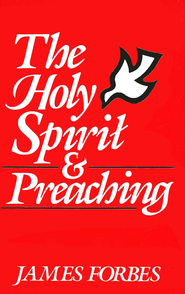
This book review of James Forbes’s The Holy Spirit and Preaching was written as part of Pastor Lane’s doctoral course work, and as such, it is written in a more formal, academic tone than the rest of this blog’s posts. Still, we hope the audience will find these academic book reviews useful, which is why we have published them for your reference.
The Holy Spirit and Preaching addresses a most vital issue for any one who claims to be a Christian preacher: the anointing of Holy Spirit in preaching. None would likely argue that the Spirit’s power is not necessary. Most seem to disagree on how that power is actually experienced. This book dares to consider a theological and practical consideration to challenge every preacher to seek Holy Spirit’s anointing in the preaching event.
The book is divided into six concise, but helpful, chapters. The introduction addresses the issue from a broad perspective, beginning with the author’s own journey. The purpose of this book is explicit from the author’s own defining conviction that, “If a greatly improved quality of preaching is to be experienced in our time, it will stem from the renewing power and presence of Holy Spirit.” A compelling display of biblical and theological arguments are set forth to encourage and help the preacher in a deeper pursuit of the anointing of the Holy Spirit.

Preaching and the Holy Spirit explores the relationship of the two and the necessity for the Spirit in preaching, as an extension of the Spirit’s ongoing ministry in the world. The importance of this relationship is further explained by the author when he says, “The quality of the preaching is affected most significantly by the level of awareness of the movement of the Spirit shared by those in the pulpit and the pew.” A common problem is that many find it difficult to know for certain that the Spirit is shaping their personal and religious experience. Furthermore, the author states a concern that, “Those forces that reduce our freedom to speak of the Holy Spirit also may be working against any diligence in seeking the guidance and the empowerment of the Spirit.” Against this problem and concern, he offers ten dimensions of Holy Spirit’s anointing in Jesus’ life as a means to understanding it in ours.
“The Anointing of Jesus” is a beneficial chapter with helpful insight to personally understand and evaluate one’s life. “The anointing of the Spirit makes a difference in our understanding of the context, content, and concept of preaching” is helpful to shape one’s expectations that will be framed by the anointing. Seven marks of Holy Spirit anointing are given:
- Wholehearted dedication
- Willingness to witness
- Faithfulness
- Guidance system
- Power
- The “plus factor”
- One’s own “convinced” nature that their efforts will make a difference
The last three chapters consider preaching, sermon preparation, and spiritual formation under the Spirit’s anointing. These are helpful chapters that offer practical and helpful engagement for the preacher to practice in order to experience and operate under the anointing. The most helpful aspect of these three chapters, as well as the whole nature of the book, is the author’s intentional pursuit to include any earnest seeker’s desire to experience the anointing, regardless of background or tradition. This is inherent in the book and is often addressed in writing, as the author resonates a heartfelt desire to help preachers operate in the anointing of Holy Spirit at all times.
More book reviews by Pastor Lane: